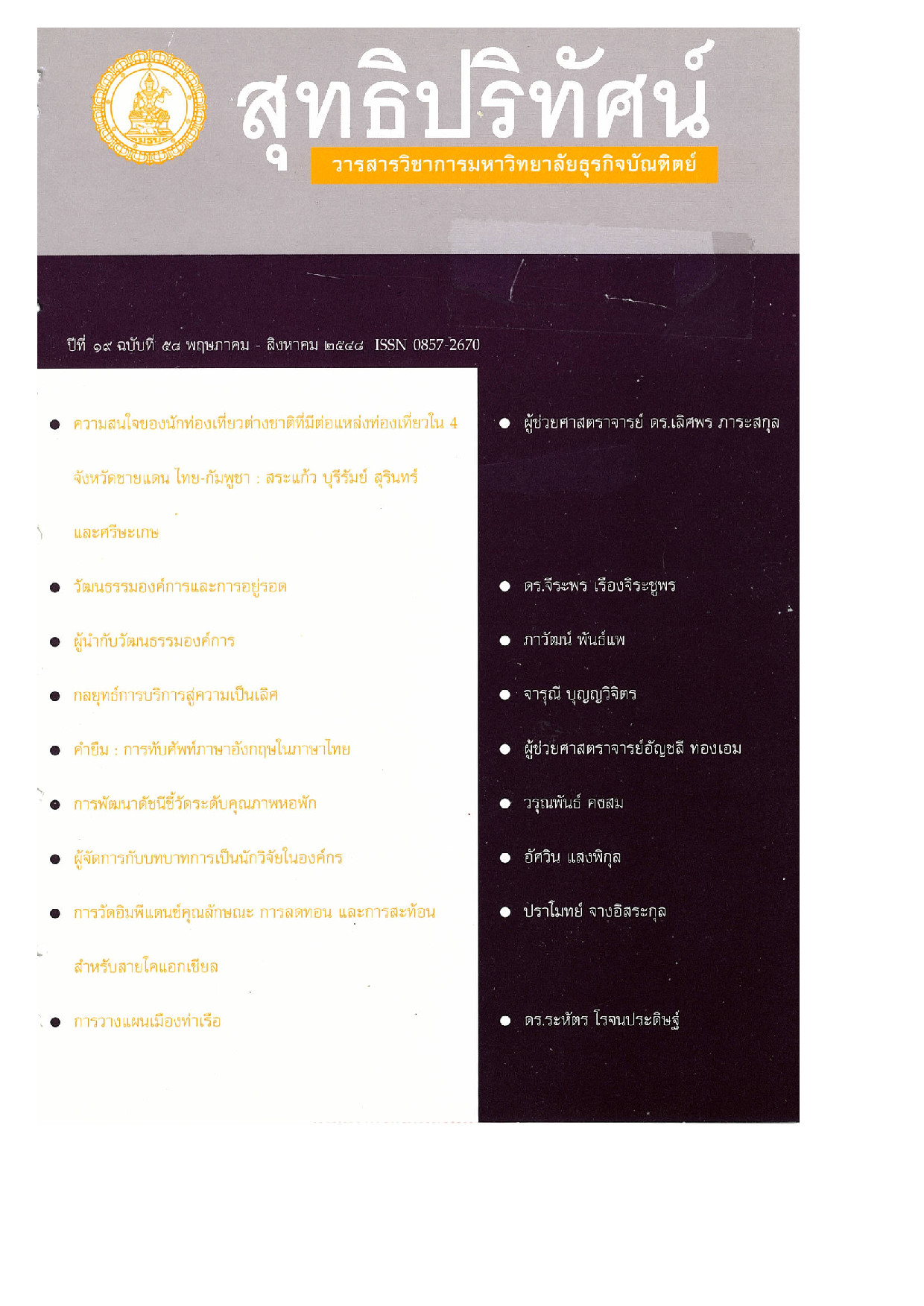วัฒนธรรมองค์การและการอยู่รอด
บทคัดย่อ
ข้อความบทคัดย่อไม่สมบูรณ์ กรุณาดูฉบับพิมพ์
เอกสารอ้างอิง
Ashkanasy, Neal M., Wilderom, Celeste P., and Peterson, Mark F. (2000). Handbook of organizational culture & climate. CA : Sage Publications.
Balthazard, Pierre A. and Cooke, Robert A. (2004). Organizational Culture and Knowledge Management Success: Assessing The Behavior-Performance Continuum. Proceeding of the 37th Hawaii International Conference on System Sciences-2004, Retrieved September 10, 2004, from the IEEE Computer Society web site, http://csdl.computer.org/comp/proceedings/hicss/2004/2056/08/205680239a.pdf
Cooke, Robert A. and Rousseau Denise M. (1988, September). Behavioral Norns and Expectations : a quantitative approach to the assessment of organizational culture. Group & Organization Studies : 13, 3, p. 245-273.
Daft, Richard L. (2002). The Leadership Experience. (2nd ed.) Fort Worth, TX : Harcourt College Publishers.
Denison, Daniel R. (1990). Corporate culture and organizational effectiveness. New York : Wiley.
Frost, Susan H. and Gillespie, Theresa W. (1998, Winter). Organizations, Culture, and Teams : Links toward genuine change. New Directions for Institutional Research, No. 100, p. 5-15.
Hesselbein, Frances, Goldsmith, Marshall and Beckhard, Richard. (Eds.). (1996). The leader of the future : new visions, strategies, and practice for the next era. Forword by Peter F. Drucker. San Francisco : Jossey-Bass.
Hooijberg, Robert, Petrock, Frank. (1993). On culture change: using the competing values framework to help leaders execute a transformational strategy. Human Resource Management, 32, 1, p.29-50.
Kotter, John P., Heskett, James L. (1992). Corporate culture and performance. New York : Free Press.
McKenna, Stephen D. (1992). A culture instrument : driving organizational learning. Leadership & Organization Development Journal, 13, 6, p. 24-29
McKenna, Terry. (2003, November). Measuring your business culture. National Petroleum News, 95, 12, p.16.
Moorhead, Gregory and Griffin, Ricky W. (2001). Organizational Behavior : Managing people and organizations. 6th ed. Boston: Houghton Mifflin.
Nelson, Debra L. and Quick, James Campbell. (2003). Organizational behavior : foundations, realities, and challenges. (4th ed.) : Mason, Ohio : Thomson/South-Western.
Peters, Thomas J., Waterman, Robert H. (1982). In search of excellence: Lessons from America's best-run companies. New York: Harper & Row
Pool, Steven W. (2000). Organizational culture and its relationship between job tension in measuring outcomes among business executives. The Journal of Management Development, 19, 1, p. 32-48
Reigle, Ronda F. (2001). Measuring organic and mechanistic cultures. Engineering Management Journal, 13, 4, p 3-8.
Robbins, Stephen P. (2003). Organizational Behavior. (10th ed.). New Jersey : Prentice Hall. Rodriguez, Sonia Dasi et. al. (2003). An empirical study about the effect of cultural problematic on organizational learning in alliances. The Learning Organization, 10, 3, p. 138-148.
Schein, Edgar H. (1983, Summer). The role of the founder in creating organizational Culture. Organizational Dynamics, 12, 1, pp. 13-28.
Sherriton, Jacalyn, Stern, James. (1997, April). HR s role in culture change. HR Focus, 74, 4, p. 27.
Westbrook, Jerry D. (1993, January/February). Organizational culture and its relationship to TQM. Industrial Management, 35, 1, p. 1-3.
Zwell, Michael. (2000). Creating a culture of competence. New York: John Wiley & Sons.
ดาวน์โหลด
เผยแพร่แล้ว
รูปแบบการอ้างอิง
ฉบับ
ประเภทบทความ
สัญญาอนุญาต
เนื้อหาและข้อมูลในบทความที่ลงตีพิมพ์ในวารสารสุทธิปริทัศน์ ถือเป็นข้อคิดเห็นและความรับผิดชอบของผู้เขียนบทความโดยตรงซึ่งกองบรรณาธิการวารสาร ไม่จำเป็นต้องเห็นด้วย หรือร่วมรับผิดชอบใด ๆ
บทความ ข้อมูล เนื้อหา รูปภาพ ฯลฯ ที่ได้รับการตีพิมพ์ในวารสารสุทธิปริทัศน์ ถือเป็นลิขสิทธิ์ของวารสารสุทธิปริทัศน์หากบุคคลหรือหน่วยงานใดต้องการนำทั้งหมดหรือส่วนหนึ่งส่วนใดไปเผยแพร่ต่อหรือเพื่อกระทำการใด ๆ จะต้องได้รับอนุญาตเป็นลายลักษณ์อักษรจากวารสารสุทธิปริทัศน์ก่อนเท่านั้น







